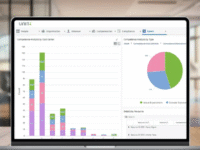What’s the difference between management accounting and financial accounting?

What is a financial accountant?
For the organisation they work for, financial accountants are in charge of developing reporting that adheres to industry standards. They are responsible for keeping track of and reporting all financial information so that creditors, investors, and regulators may evaluate the performance and solvency of the company.
As a financial accountant, it would be your job to make sure that company income statements adhere to rigid reporting requirements. Additionally, you’ll serve as the primary contact for matters relating to taxes, pensions, audits, and other aspects of money.
When deciding whether position is best for you, there are important differences between the two roles that you should be aware of: Management accounting is based on current and future trends and is used internally, whereas financial accounting examines the past and is intended for an external audience.
Financial Accounting Duties
- Primary point of contact for tax, pension, audit, insurance, rates, and statutory return-related concerns.
- Monthly and quarterly reporting
- Tax and year-end reporting packet
- Make ensuring that all business accounts correspond to the standards for internal and external audits.
- VAT returns
- Creating reconciliations for the balance sheet
- Carrying out internal audits
Qualifications and competencies for financial accountants
- ACA or ACCA certification
- Knowledge of UK statutory reporting
- Strong technical accounting and reporting skill
A management accountant is what?
A management accountant provides incredibly thorough reporting that aids managers in the company in making educated decisions. Their customised reports, which are produced for internal use, are intended to support budget planning, risk management, and the identification of investment possibilities.
Government agencies as well as both public and private businesses may hire management accountants. They can also be relied upon to do business partnership activities. They support the Board of Directors and the CEO in making strategic choices.
Management Accounting Duties
Although it’s not usually required, some companies may require a degree as a prerequisite for employment. Before becoming a fully qualified management accountant, you can anticipate working for three to four years while earning your ACCA or CIMA certificate. Following that, candidates have the choice of pursuing a career as a financial manager or choosing the in-demand but fiercely competitive path of commercial finance.
Duties of a Management Accountant
- Analysing finances
- Reporting on business performance
- making monthly account preparations
- preparing the payroll each month
- Forecasting and control of cash flow
- creating budgets and projections
- Whenever necessary, assist in the response to requests from senior management and other stakeholders.
Qualifications and Competencies for Management Accountants
- A CIMA, ACA, or ACCA credential
- knowledge of VAT, PAYE, and IFRS
- abilities for analysis and critical thinking
Reporting
The reporting standards used in management accounting and financial accounting are extremely dissimilar. Financial accounting must abide by stringent GAAP or IFRS reporting rules because it is designed to provide information to third parties. However, as they produce reports for internal use only, management accountants adhere to the format specified by the company to meet its requirements.
Management accounting focuses on particular facets of the firm, frequently producing in-depth statistics on sales by client group, product category, etc. Financial Accountants, in contrast, view the business from a broad perspective. They provide financial updates for all companies in accordance with standards set by the sector.
Timelines
Management accountants estimate the future and use historical data to inform strategic business decisions. Financial Accountants, on the other hand, are in charge of reporting on prior financial periods.
Focus
Accountants are more concerned with forecasting and planning for the future utilising financial data from the company. They use their expertise to advise senior management on strategy and decision-making.
In order to effectively reflect corporate performance and financial stability, financial accountants serve the company by producing flawless reports and financial records. They ensure that the company’s finances are up to date with industry standards and audit ready.
If you like this article, read more over at our website and if you would like to see how Itas Solutions can help you and your organisation reap the benefits of financial accounting with the latest cloud solutions for your business accounting needs with powerful cloud accounting software such as Sage’s Intacct, we will only be too happy to show you the benefits and how we can help.
WHO WE ARE
Itas Solutions began in 1995 with just one client and today serves over 200 businesses around the UK and we are always on call to help our clients.
Itas is a company trusted by our clients for more than 20 years, and we have grown through customer and IT professional recommendations who appreciate the knowledgeable yet individualised service we provide.
You can reach out to us at info@itassolutions.co.uk, give us a call at +44 (0) 1824 780 000, or send an email to learn more about how Itas can assist your company with finance automation, Sage implementation, and improved purchasing control.





